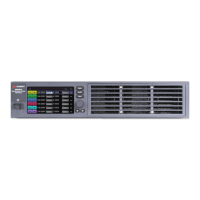STATus Subsystem
Status register programming lets you determine the operating condition of the instrument at any time.
The instrument has three groups of status registers; EDP, Operation, Questionable, UNR, and Standard
Event. The Operation and Questionable status groups each consist of the Condition, Enable, and Event
registers as well as NTR and PTR filters.
The Status subsystem is also programmed using Common commands. Common commands control
additional status functions such as the Service Request Enable and the Status Byte registers. Refer to
Status Tutorial for more information.
STATus:EDP:CONDition? (@<chanlist>)
Queries the condition register for the EDP Status group. This is a read-only register, which holds the
live (unlatched) Excessive Dynamic Protection status. Reading the EDP Status Condition register does
not clear it.
Parameter Typical Return
<chanlist> one or more channels <bit value>
Read the EDP status condition register: STAT:EDP:COND? (@1
l
The value returned is the binary-weighted sum of all enabled bits in the register. For example, with
bit 3 (value 8) and bit 5 (value 32) set and enabled, the query returns +40.
l
The condition register bits reflect the current condition. If a condition goes away, the cor-
responding bit is cleared.
l
*RST clears this register, other than those bits where the condition still exists after *RST.
STATus:FRAMe[:EVENt]
Queries the event register for the Frame Status group. This is a read-only register, which stores
(latches) all events that are passed by the Frame NTR and/or PTR filter. Reading the Frame Status
Event register clears it.
Parameter Typical Return
<chanlist> one or more channels <bit value>
Read the Frame status event register: STAT:FRAM?
l
The value returned is the binary-weighted sum of all enabled bits in the register. For example, with
bit 3 (value 8) and bit 5 (value 32) set and enabled, the query returns +40.
l
*RST has no effect on this register.
5 SCPI Programming Reference
132 Keysight MP4300 Series Operating and Service Guide

